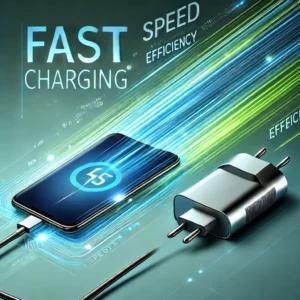Separating Myths From Facts About Fast Charging
Curious about fast charging and its impact on your smartphone battery? Discover how it works, common myths, and expert tips to preserve battery life without compromising on speed.
Understanding Fast Charging
How Fast Charging Works
Fast charging allows your phone to recharge significantly faster by delivering higher wattage compared to standard chargers. While traditional chargers provide 5-10 watts, fast chargers deliver anywhere from 15 to over 100 watts. This process typically occurs in two stages:
- Initial High-Speed Charging: The battery charges at a high voltage until it reaches 70-80% capacity.
- Trickle Charging: Charging slows for the remaining 20-30% to reduce heat generation and prevent damage.
Technological Advancements in Fast Charging Protocols
Manufacturers employ advanced technologies like Quick Charge, Power Delivery, and VOOC to optimize the energy transfer. These innovations, paired with smarter charging designs, have significantly reduced the risks of overheating and battery degradation.
Do Fast Chargers Harm Your Battery?
The Real Impact of Fast Charging on Battery Health
Modern smartphones are equipped to handle fast charging without significant harm. Features like thermal management systems, multi-stage charging, and optimized power delivery ensure safety. However, heat remains a concern as it accelerates battery wear.
Why Batteries Degrade Over Time
Battery degradation is inevitable due to the chemistry of lithium-ion cells. Over time:
- Electrolyte Crystallization: Salts in the electrolyte form solids, reducing ion flow and battery efficiency.
- Structural Deterioration: Repeated charging can remove lithium ions from the internal structure, permanently affecting capacity.
If you want read more about the Pros and cons about fats charging, don;t forget to read out blog article “Everything you need to know“.
How Phones Combat Battery Damage
Heat Management Innovations
- Thermal Shields and Cooling Systems: Devices now include layers, cooling pipes, or even fans to dissipate heat.
- Smart Charging Algorithms: Phones gradually reduce charging speed as the battery approaches full capacity to avoid overheating.
Battery Optimization Settings
Many phones can “learn” your habits, delaying full charging until just before you wake up or need the device.
Debunking Charging Myths
Myth 1: Charging Beyond 100% Damages Batteries
False. Modern devices stop charging automatically once full, preventing overcharging.
Myth 2: Slow Charging is Always Better
Partly True. While slower charging is gentler, fast charging is safe when used as intended.
Myth 3: Non-Original Chargers Harm Batteries
False. Certified alternatives are safe, though original chargers often ensure maximum efficiency.
Myth 4: Frequent Charging Shortens Battery Life
False. Lithium-ion batteries thrive with regular, partial charges. Keeping your battery between 20-80% is more beneficial than fully draining it.
Practical Tips for Prolonging Battery Life
- Use Certified Chargers: Always stick to chargers that meet safety standards.
- Avoid Extreme Temperatures: Keep your device away from heat sources or freezing environments.
- Alternate Between Fast and Regular Charging: Use standard chargers when time allows.
- Maintain a Healthy Charge Range: Regularly charge between 20-80% to reduce battery stress.
For more tips, please read our blog on The Ultimate Guide to Fast Chargers.
Fast Charging: A Safe and Convenient Solution
Fast charging has revolutionized the way we use smartphones. Modern phones are built with safeguards like thermal management and charging optimization, making the technology safe for everyday use.
By adopting smart charging habits—avoiding excessive heat, using certified accessories, and alternating between charging modes—you can maximize your battery’s lifespan while enjoying the convenience of fast charging.
FAQs
Q: Can I use any fast charger for my phone?
No, always use a charger recommended by your phone manufacturer to ensure compatibility and safety.
Q: Is wireless fast charging better than wired?
Wired charging is typically faster and more efficient, though wireless charging offers convenience at the cost of generating more heat.
Q: What happens if you charge a battery too fast?
Excessive speed can lead to overheating, but modern phones are equipped with safeguards to regulate power delivery and prevent damage.




